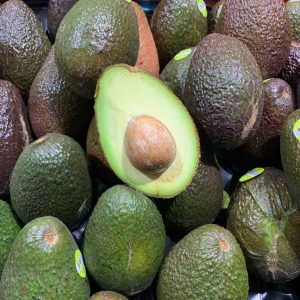Onome Amuge
Avocado, also known as ‘alligator pear’ or ‘butter fruit,’ is rapidly gaining prominence on the global agricultural stage and revered globally for its versatile derivatives, health benefits, and distinctive taste.
According to leading market research firm Grand View Research, the global avocado market was valued at $14.85 billion in 2023 and is projected to expand at a compound annual growth rate (CAGR) of 7.3 per cent from 2023 to 2030.
The strong growth is underpinned by an escalating global focus on healthy lifestyles, an expanding consumer base for nutritious food products, and its increasing utilisation across the cosmetic, confectionery, pharmaceutical, and beverage industries. Boosted by growing awareness of its nutritional value, an expanding global middle class, and rising import demand, the avocado industry is poised for more expansion, analysts agree.
Among the numerous avocado varieties, the Hass avocado stands out as the global benchmark for commercial production. Recognisable by its dark green, bumpy skin, the Hass variety’s popularity is attributed to its long growing season, prolific fruit production, and outstanding shipping tolerance. These unique virtues have cemented Hass as the most sought-after variety in the international market.
Nigeria, long reliant on oil, is now looking to diversify its economic landscape, and the Hass avocado has emerged as a promising candidate. This premium variety was recently introduced into the Nigerian market, with initial seedlings imported from Mexico, the world’s largest producer, and Kenya, Africa’s leading avocado producer.
Unlocking local potential: Creating jobs and revenue from Hass
The Avocado Society of Nigeria (ASN) is at the forefront of championing the Hass avocado’s potential within the country. The association pointed out the fruit’s ease of cultivation and its capacity to generate over 35,000 jobs by 2027.
Adeniyi Sola-Bunmi, the executive director of the ASN and an Israeli-trained agribusiness development and value chain expert, has advocated for governmental attention to Hass avocado, projecting its potential to generate over N12 billion annually for the Nigerian economy.
Sola-Bunmi acknowledges that while the indigenous avocado variety is commonplace in local markets across Nigeria, the Hass variety’s presence is still in the early stages of market penetration, primarily confined to larger malls and supermarkets.
Despite the challenges encountered during the cultivation journey, including the complex process of importing viable seedlings, Sola-Bunmi expresses optimism. “I believe this variety of avocado can thrive in Nigeria, and I am happy I could make this a reality despite the high level of challenges we encountered in the cultivation journey,” he remarked.
The ASN executive director confirmed that the Hass avocado tree adapts well to Nigeria’s tropical climate, capable of reaching full maturity in as little as three years. He further disclosed that the variety is currently flourishing in the southern and central parts of Nigeria, with a growing number of local farmers embarking on its cultivation.
This surge in interest is largely spurred by the Hass variety’s higher price tag and significantly greater yields compared to local variants, making it a highly attractive crop for Nigerian farmers seeking swift returns.
“This means that the availability of Hass avocados in Nigeria is likely to grow in the near future, which should create a strong market,” he added.
Bridging the supply gap: Challenges and initiatives
Despite the promising outlook, Sola-Bunmi pointed out that Nigeria’s current production of Hass avocado remains limited, with the majority of the crop still imported. This reliance on imports has raised concerns about the domestic supply’s ability to keep pace with increasing demand, as Nigeria is yet to achieve the anticipated commercial-scale Hass avocado production.
In response, the Avocado Society of Nigeria is actively pursuing a number of initiatives aimed at boosting local production. These include implementing better soil management practices, improving irrigation systems, and establishing robust pest control mechanisms.
The association also noted that it has commenced the setup of large farms for its members across key states, primarily in the South East, South West, and South South regions, with plans to integrate advanced farming techniques in future cultivation efforts. “For now, we are focusing on farmers in Imo, Ogun, Abia, Enugu, Ebonyi, Edo, Akwa Ibom, Delta, Cross Rivers and Oyo States,” Sola-Bunmi said.
Export market potential and economic diversification
The ASN executive director underscored the opportunities for commercial production of Hass avocado for export, contingent upon the Nigerian government demonstrating concrete interest and investing in the industry’s development. This, he stated, would entail providing the necessary framework for the entire value chain, from production and product development to processing and marketing of avocado and its derivatives.
Sola-Bunmi asserts that Hass avocado has the capacity to generate thousands of jobs, provide a reliable source of income for farmers, and contribute to environmental protection in the long run. Furthermore, he asserted that the processing of avocados into high-value products such as avocado oil could emerge as a key source of foreign exchange earnings for Nigeria.
Ecofarms & Agro Services Limited, a Nigerian agricultural research and service provider, corroborates the preference for Hass avocado, citing its firm, creamy texture, rich oil content, and its extended shelf life of two to three weeks when properly stored. This attribute makes it highly desirable to consumers and commercially viable.
The company noted that years of unsustainable agricultural practice are slowly turning a large proportion of arable land into unproductive lands. It added that with the rising cost of farm inputs, cultivating staple grains is increasingly becoming more challenging.
“The growing global avocado market, valued at over $15 billion and growing, provides an opportunity to change this narrative. Farmers are encouraged to intercrop Hass avocado trees in their crop fields as an additional source of income,” it suggested.










